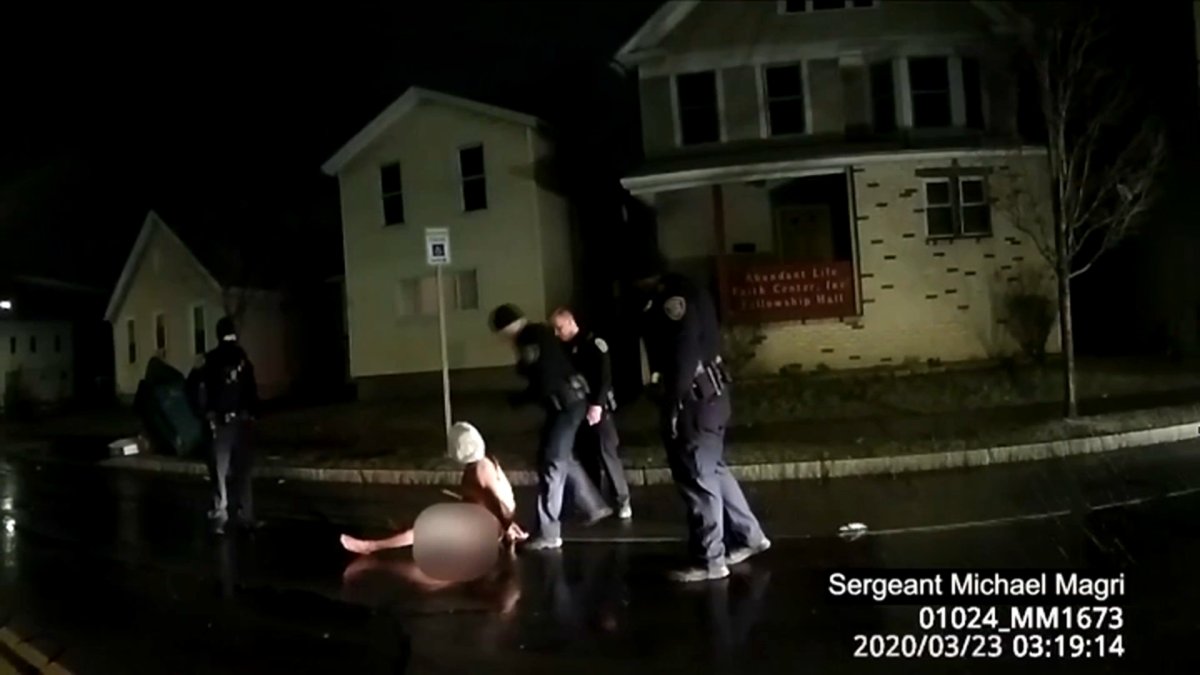ROCHESTER, N.Y. — Daniel Prude died of complications due to asphyxia in the setting of physical restraint, due to excited delirium, due to acute PCP intoxication — at least that’s what his autopsy report says. David Fisher, a legal consultant and document specialist with a medical examiner expertise, says otherwise.
Prude, a 41-year-old Black man from Chicago, died after an encounter while in police custody. He was arrested in the early morning on March 23, 2020, while he was going through a mental health crisis. He was found to have PCP in his system at the time. Body camera footage of the encounter that was released to the public on Sept. 2, shows that Prude was compliant to officer’s orders when he was arrested. During the arrest he displayed erratic behavior, leading officers to put a mesh bag, or a spit sock, over his head to keep him from spitting.
He stopped breathing while lying naked, handcuffed, on the ground in 30-degree weather while he was pinned down by multiple Rochester police officers. After his heart stopped he was taken to the hospital and put on a ventilator. He died a week later.

The medical examiner who performed Prude’s autopsy, Nadia A. Granger, ruled his death as homicide.
After reviewing the report, Fisher says there are many faults that suggest tampering or falsifying an autopsy report.
Fisher says that through his own investigations, he has gotten 10 chief medical examiners in Texas fired for tampering with or falsifying autopsy reports. He has also led to the shut down of two medical examiners offices. He was very active in investigating the prominent cases of Rodney Reed and Sandra Bland — and now he’s saying that Prude’s autopsy report shows tell-tale signs of tampering.
‘Excited delirium is not a recognized medical term’
According to Fisher, Granger starts out the autopsy report correctly, stating that the manner of death is homicide. However, he says the following causes of death have no foundation.
Excited delirium is a controversial medical term. According to the United States Library of Medicine National Institutes of Health, excited delirium is “characterized by agitation, aggression, acute distress and sudden death, often in the pre-hospital setting. It is typically associated with the use of drugs that alter dopamine processing, hyperthermia, and, most notably, sometimes in the death of the affected person in the custody of law enforcement.”
The NCBI also states that excited delirium is not a recognized medical or psychiatric diagnosis, according to the Diagnostic and Statistical Manual of Mental Disorders or the International Classification of Diseases of the World Health Organization. The term is often used in cases involving cocaine — and very seldom with PCP, LSD, or methamphetamine.
Fisher points out the fact that there is no physical evidence that points to excited delirium. Nowhere in the report includes Prude’s body temperature at the time of admission (hyperthermia). Additionally, the levels of PCP collected from his blood samples at the hospital were so low that he could’ve been driving without being over the legal limit of intoxication.
The toxicology report used the blood samples that were taken upon Prude’s admission on March 23. No other blood was drawn or tested in-house for the autopsy report.
Without evidence of extremely high body-temperature, and without a significant amount of drugs in his system, Fisher says there are no grounds to cite excited delirium as a cause of death.
‘Daniel suffered three serious to fatal brain injuries, which were the result of criminally negligent actions by three different officers’
Fisher breaks down what he sees happening in the video, and notes that it’s similar to what happened to George Floyd and Eric Garner.
“What the medical examiner found was a brain stem separation and herniation of the brain, each caused by a different officer. The brain subfalcine herniation was caused by the officer holding Daniel’s head to the ground with a major part of his body weight. The brain stem transtentorial herniation was most likely caused by the officer leaning on Daniel’s neck. These two injuries would have led to Daniel’s death over time, but it was the officer kneeling on Daniel’s back who actually killed him, which would have occurred within a minute or so.”
Fisher says when pressure is applied to the mid-torso and the shoulders are tilted forward due to being handcuffed, Prude’s stomach was pushed up into his chest cavity, forcing the air out of his lungs upon exhale.
The term for this is “compression suffocation,” Fisher says. He notes that officers are specifically trained not to do this.
Prude used the last remaining air in his lungs to say that he couldn’t breathe. Once he exhaled, he physically couldn’t inhale again.
Fisher says this is why many people who have died in police custody in a similar way say the same thing. It’s because they physically can’t inhale. Often, these are their final words. This, he says, leads to a quick brain death.
“This is the reason the medical examiner glossed over the brain injuries caused by two other officers, but this is still considered tampering and/or falsifying an autopsy report,” Fisher said.
He also points out that the medical examiner didn’t take any slides of the brain — and claims this is so no one can challenge her work. According to the National Association of Medical Examiners recommendations for the investigation of a death in custody, the medical examiner should “collect specimens from the femoral blood, heart blood, brain, liver, vitreous, urine, and gastric contents.”
There were no slides taken of the brain, no urine collected, and the liver was donated.
‘They kept Daniel on life support for a week for the sole purpose of organ donation’
Daniel Prude’s liver was harvested and donated. Fisher says this is very strange, and often unheard of considering his drug use.
“It is now my belief the reason they kept Daniel Prude on life support for a week was for the sole purpose of organ donation,” Fisher said. “They were waiting for his body to metabolize all of the PCP. Also during that week on life support allow the body to heal and hide other evidence of injury.”
‘Did she looks at the body cam footage before the autopsy? Did she receive a written investigator’s report? How would she know what to look for in the autopsy?’
It recently became public knowledge that a lieutenant with the Rochester Police Department asked Granger to meet before the autopsy. This raises a number of questions. What did the lieutenant ask, or tell Granger? Was it recorded?
Fisher says if the two did meet prior to the autopsy, it had to be recorded. Otherwise, it would suggest interference, which could be be an illegal meeting.
An investigation report would detail the encounter from March 23, which would give the medical examiner a foundation of what she needs to look for in the autopsy. No investigation reports have been released to the public at this time.
This points to the assumption that Granger may have relied on what the lieutenant said happened, and based the autopsy off of that.
The Stylus reached out to the Monroe County Medical Examiner’s Office and has not yet heard back.
‘There is abundant evidence the medical examiner on her own, or was leaned on to misstate the cause of death to protect the at fault officers’
Fisher said that after reviewing the autopsy and toxicology reports, his opinion is that the medical examiner either misstated Prude’s cause of death on her own or because she was leaned on in order to protect the police officers at fault.
So what does this mean?
Fisher says the causes of death listed would most likely be considered manslaughter or criminally negligent homicide.
He says after watching the body camera footage and reading the report, he can safely say with no doubt, that the officers approach was more than criminally negligent and rises to the level of second degree murder.
If what Fisher says is correct, then Granger knowingly tampered with Prude’s autopsy report in order to protect the officers involved.
No officers have been charged in Prude’s death. The seven involved have all been suspended with pay.





















